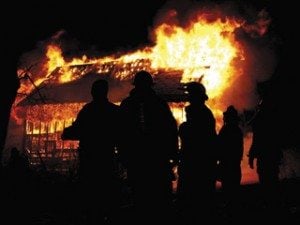Some memories not missed during cold weather
Most livestock animals are well adapted to cold weather, but farmers take extra measures when extreme temperatures come.
Read MoreAs fall sets in, it seems like we’re hearing about more fires on farms.
Whether it’s the dry conditions, faulty equipment or just the unpredictable nature of farming, it’s a stark reminder of the risks that farmers face every day. This season alone, there have been several devastating fires, including one at Comp Dairy in September. In just a matter of minutes, their entire milking parlor was engulfed in flames, forcing the relocation of nearly 1,100 milk cows. The fire didn’t just threaten their business; it threatened their entire way of life.
For many farm families, the farm is more than just a place of work. It’s their identity, their heritage and their livelihood. It’s where generations have toiled, sacrificing time, energy and resources to build something lasting. The connection farmers have to their land is profound — it’s built on years of sweat, perseverance, and in many cases, lots of prayers. So, when a fire occurs, the damage goes far beyond the financial — it’s a gut-wrenching blow to their very sense of self.
Despite this, barn fires have become a hot topic online, often leading to conspiracy theories, misinformation and gossip. This kind of speculation can be incredibly hurtful, especially when farmers are still reeling from the loss. The reality is that farming is inherently risky, and the causes of these fires are often linked to the daily challenges farmers face, not some sinister plot.
There are many hazards on a farm that can lead to fires. Barns, especially older ones, may have outdated wiring that can pose a risk. Rodents, despite the best efforts to control them, can chew through wires, sparking fires. The very nature of farming means it’s a dirty environment; dust, straw and other flammable materials are everywhere. Agricultural machinery can overheat, especially during heavy use. Exhaust systems, engines, and brakes generate significant heat, which can ignite dry plant material like straw or chaff. Combine this with chemicals, electrical equipment, and the heavy machinery that operates daily, and it’s clear how quickly things can go wrong.
Diesel, gasoline, and propane are essential on farms but pose a fire risk if not stored properly. Leaking fuel containers or spills can easily ignite if exposed to a spark or flame. Farmers also deal with highly combustible materials like hay and grain. If stored hay or straw has too high a moisture content, microbial activity can generate heat, leading to spontaneous combustion. Wet grain can also heat up during storage, creating a fire hazard, especially in grain bins where the heat can become trapped. And while farmers work hard to check the moisture levels, it’s impossible to inspect every single bale or bushel when handling thousands of acres or bales. It’s a delicate balancing act, and despite their best efforts, fires can still happen.
The risk is ever-present, and the potential for disaster is high. But what makes these incidents even more heartbreaking is the response they often receive online. Rather than rallying behind those affected, some take to the internet to spread unfounded theories or cruel comments. This only adds insult to injury for families who are already dealing with immense loss.
Instead of jumping to conclusions or spreading rumors, we should take a moment to understand the real dangers farmers face every day. Farms are complex operations with countless variables at play, many of which are beyond a farmer’s control. What happened at Comp Dairy is a stark reminder of these risks. But it’s also a testament to the incredible strength of our community.
When the Comp family faced this tragedy, hundreds of people came together to help. They proved that in times of crisis, there’s still so much good in this world. Neighbors, friends, and even strangers offered their time, equipment, and support. It’s this spirit of community that defines rural America and reminds us of the resilience and generosity that are so deeply rooted in our farming communities.
So, as we hear about more fires and the rumors that often follow, let’s choose compassion over speculation. Let’s support our farmers, who are facing unimaginable challenges. Instead of spreading gossip, let’s spread kindness. If you’re ever curious about the hazards farmers deal with daily, visit a farm, ask questions, and learn about the incredible work being done to feed our communities.
In times like these, let’s be part of the solution. Let’s be like the many who came together for the Comp family — showing that when disaster strikes, our community can rise above and prove that goodness still prevails.
Submitted by Mandy Orahood, the organization director at Ohio Farm Bureau Federation for Ashtabula, Geauga, Lake and Trumbull counties.
OFBF Mission: Working together for Ohio farmers to advance agriculture and strengthen our communities.
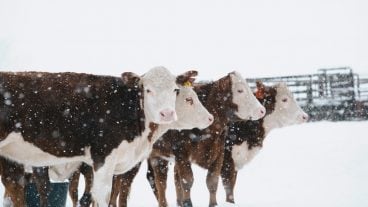
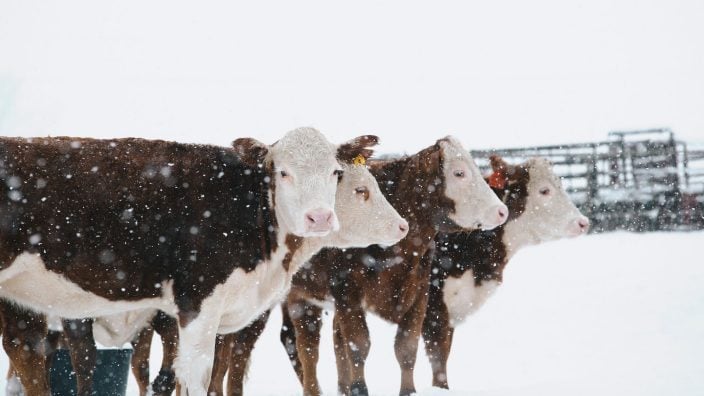
Most livestock animals are well adapted to cold weather, but farmers take extra measures when extreme temperatures come.
Read More

We often talk about the moments that shape us — big decisions, career paths and life milestones. But more often than not, it’s not the moments that define us. It’s the people.
Read More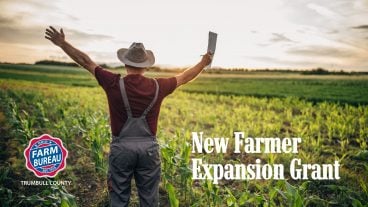
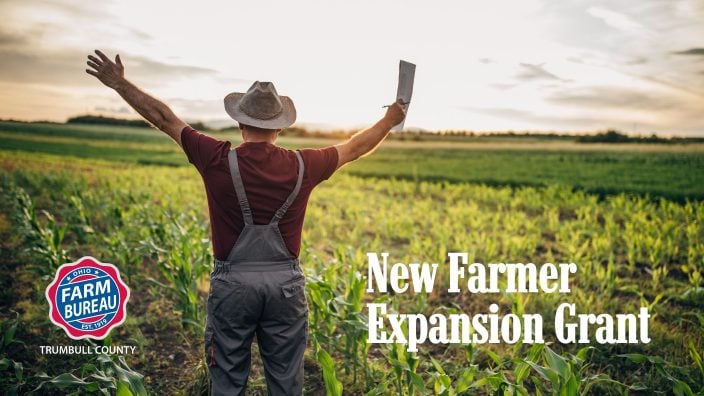
The purpose of this $1,500 grant is to help offset farm operation costs. This can include but is not limited to: fuel costs, fertilizer costs, equipment costs, land rent, etc.
Read More

I’m going to give you a list of things that you can do that will get you outside and actually enjoy the snow.
Read More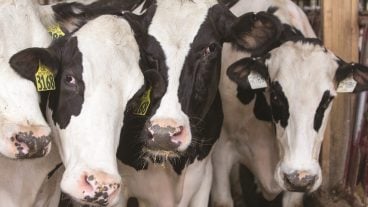

As kids, we are often told to try new things, whether it be a new food, a new activity or…
Read More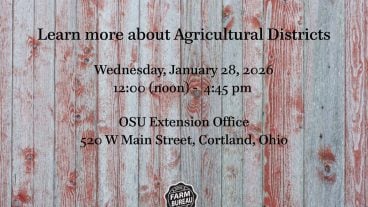
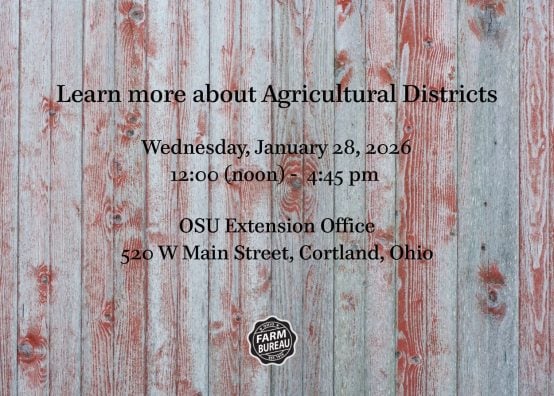
Learn more about ag districts from noon to 4:45 p.m. Jan. 28 at the OSU Extension Office, 520 W. Main Street in Cortland.
Read More
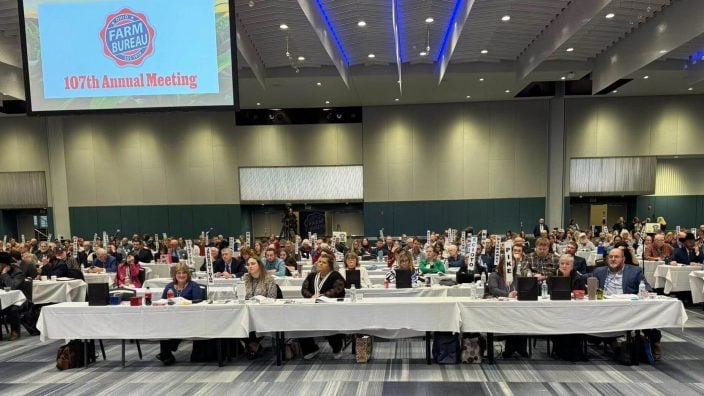
We aren’t just reacting to change — we’re shaping the future of agriculture, one conversation and one decision at a time, together.
Read More

Today, there are close to 15,000 farms growing Christmas trees in the U.S., and over 100,000 people are employed full- or part-time in the industry.
Read More

In a world that can sometimes be so loud and busy, snow literally slows us down and quiets the sound.
Read More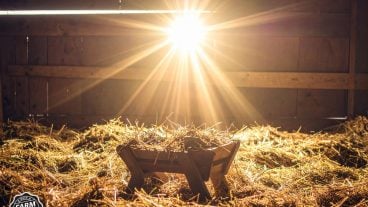
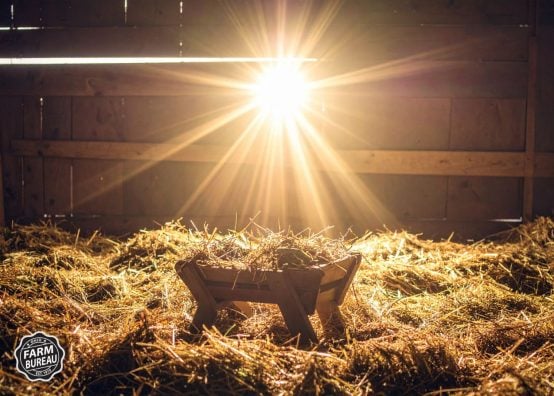
It might seem like a real chore to have to take care of the animals before any Christmas gifts or meals can happen, but to me it is such a special time.
Read More